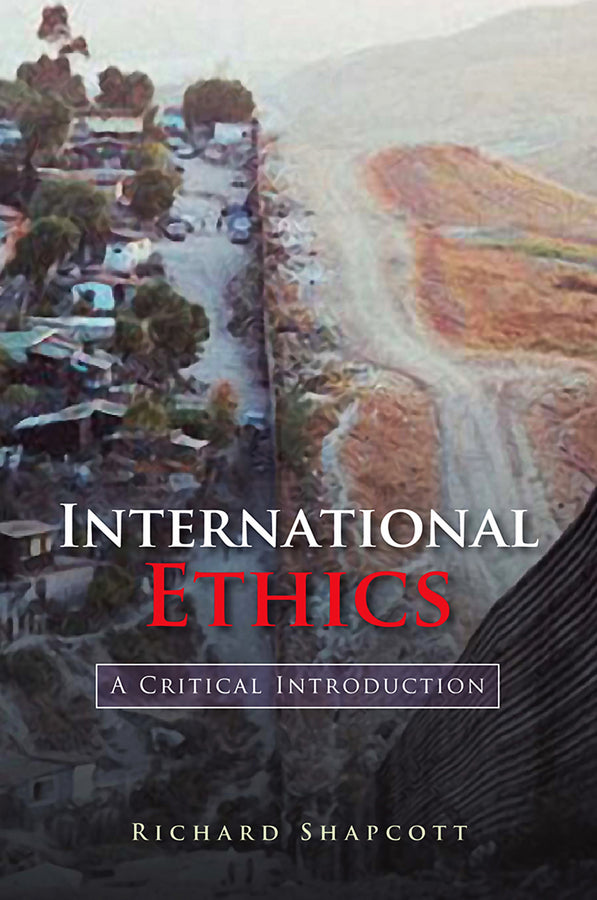Description
Explore the critical discourse surrounding global ethics with *International Ethics: A Critical Introduction*. This insightful book, authored by Richard Shapcott, delves into significant moral distinctions in a world shaped by rapid globalization and complex interdependencies. Address pressing questions regarding the obligations we hold towards 'outsiders' and scrutinize the balance between humanitarian duties and justice owed to all individuals.
This authoritative text offers comprehensive perspectives on cosmopolitanism, communitarianism, realism, and pluralism, all crucial to understanding our collective ethical responsibilities. Shapcott critically examines the ethics of hospitality, the dynamics of political community membership, mutual aid, and the ethical implications of international violence and global poverty.
With 272 pages of thought-provoking analysis, this essential resource equips students, scholars, and practitioners with a conceptual framework to dissect the ethical landscape of global governance. It fosters a deeper understanding of contemporary issues like humanitarian intervention, migration, and the approaches of governments, NGOs, and global institutions.
Perfect for anyone engaged in the field of international relations, public policy, or ethics, this book opens a pathway to examine your own stance on pressing global concerns.
Note: Shipping for this item is free. Please allow up to 6 weeks for delivery. Once your order is placed, it cannot be cancelled. Condition: BRAND NEW, ISBN: 9780745631431, Year: 2010, Publisher: John Wiley & Sons (UK), Pages: 272.
Note: Shipping for this item is free. Please allow up to 6 weeks for delivery. Once your order is placed, it cannot be cancelled.
Condition: BRAND NEW
ISBN: 9780745631431
Year: 2010
Publisher: John Wiley & Sons (UK)
Pages: 272
Description:
Is it is justifiable to make any basic moral distinction between
'insiders and outsiders'? Do we have substantive duties of
'justice' to all human beings or merely Humanitarian duties of aid
and assistance? These are two of the most crucial questions
confronting world politics and the field of international ethics
today.
International Ethics: A Critical Introduction provides an
engaging and accessible introduction to these foundational
questions. In a cogent and carefully argued analysis, Richard
Shapcott critically examines the theories of cosmopolitanism,
communitarianism, realism and pluralism and scrutinises their
approaches to the various obligations which members of 'bounded'
communities, primarily nation-states, have to 'outsiders' and
'foreigners'. He then takes the theoretical approaches in context
by discussing the ethics of hospitality and membership of political
communities, issues of mutual aid and humanitarianism abroad, the
ethics of harm related to interstate international violence, and
the challenge of severe global poverty. The book concludes by
suggesting that the terms of international ethical life in the 21st
century require reframing in a way that focuses more intently on
the nature of harm between communities and individuals.
This book provides students and scholars with a conceptual
framework with which to analyse the policies, actions and
philosophy of governments, NGOs and international corporations.
Above all, it offers the means whereby individuals can assess their
own positions on contemporary ethical issues such as global
poverty, humanitarian intervention, migration and refugees and
globa
This authoritative text offers comprehensive perspectives on cosmopolitanism, communitarianism, realism, and pluralism, all crucial to understanding our collective ethical responsibilities. Shapcott critically examines the ethics of hospitality, the dynamics of political community membership, mutual aid, and the ethical implications of international violence and global poverty.
With 272 pages of thought-provoking analysis, this essential resource equips students, scholars, and practitioners with a conceptual framework to dissect the ethical landscape of global governance. It fosters a deeper understanding of contemporary issues like humanitarian intervention, migration, and the approaches of governments, NGOs, and global institutions.
Perfect for anyone engaged in the field of international relations, public policy, or ethics, this book opens a pathway to examine your own stance on pressing global concerns.
Note: Shipping for this item is free. Please allow up to 6 weeks for delivery. Once your order is placed, it cannot be cancelled. Condition: BRAND NEW, ISBN: 9780745631431, Year: 2010, Publisher: John Wiley & Sons (UK), Pages: 272.
Note: Shipping for this item is free. Please allow up to 6 weeks for delivery. Once your order is placed, it cannot be cancelled.
Condition: BRAND NEW
ISBN: 9780745631431
Year: 2010
Publisher: John Wiley & Sons (UK)
Pages: 272
Description:
Is it is justifiable to make any basic moral distinction between
'insiders and outsiders'? Do we have substantive duties of
'justice' to all human beings or merely Humanitarian duties of aid
and assistance? These are two of the most crucial questions
confronting world politics and the field of international ethics
today.
International Ethics: A Critical Introduction provides an
engaging and accessible introduction to these foundational
questions. In a cogent and carefully argued analysis, Richard
Shapcott critically examines the theories of cosmopolitanism,
communitarianism, realism and pluralism and scrutinises their
approaches to the various obligations which members of 'bounded'
communities, primarily nation-states, have to 'outsiders' and
'foreigners'. He then takes the theoretical approaches in context
by discussing the ethics of hospitality and membership of political
communities, issues of mutual aid and humanitarianism abroad, the
ethics of harm related to interstate international violence, and
the challenge of severe global poverty. The book concludes by
suggesting that the terms of international ethical life in the 21st
century require reframing in a way that focuses more intently on
the nature of harm between communities and individuals.
This book provides students and scholars with a conceptual
framework with which to analyse the policies, actions and
philosophy of governments, NGOs and international corporations.
Above all, it offers the means whereby individuals can assess their
own positions on contemporary ethical issues such as global
poverty, humanitarian intervention, migration and refugees and
globa

